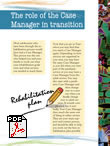- TOOL KITS
- A. The NEXT Step
- B. Promoting Independence
- C. Phone Apps
- D. Return to Work
- E. Motivational Interviewing
- F. Paediatric Brain Injury Rehabilitation Resources
- a) Introduction
- 0. Introduction
- 1. Transition
- 2. The transition wheel
- 3. Walking around the transition wheel
- 4. The transition wheel interview
- 5 . Using this kit
- 6 . Web resources
- b) Working together
- 7. My role
- 8 . My family's role
- 9. My case manager's role
- c) What can I do?
- 10. Who, where, what? The Services I receive
- 11. Accommodation
- 12. Driving
- 13.Alcohol and drugs
- 14. Social and recreational activities
- 15. Health and well-being
- 16. Relationships and friendships
- 17. Sexuality
- 18. Personal safety
- 19. Complaints/rights
- 20. Legal issues
- 21. Centrelink
- 22. Financial
- 23. Shopping
- 24. Employment, training and tertiary education
9. The role of my Case Manager in transition
Most adolescents who have been through the rehabilitation process would have had a Case Manager. This person was the one who helped you and your family to work out what your rehabilitation goals were and what services you needed to reach them.
Now that you are in Transition you may find that you need a Case Manager again. Depending on how services are organised in your area, you may have the same Case Manager as you did when you were part of the paediatric service or you may have a Case Manager from the adult service. You may also start with a paediatric Case Manager and then change over to a new one when you finally change over to adult services. It sounds complicated, but it isn’t really. Your Case Manager does much the same sort of thing in either service. They are your main support and contact person, and should be able to help you work out the best rehabilitation plan possible.
Some of the things that a case manager can help you with are as follows:
- Goal setting
- Advising you about possible services
- Talking with services, your solicitor, insurer etc
- Advocating on your behalf
- Keeping everyone informed about things
- Educating you and your family about the transition process
- Helping you become more independent
Many young people report that their case manager was the most valuable person that they met during their transition from school to the adult world. It's their job to try to help you with things that you find difficult, so don't be shy, ask them whatever you need to.


